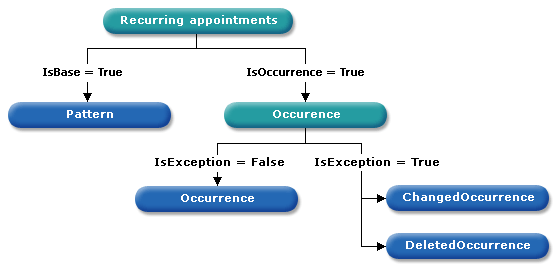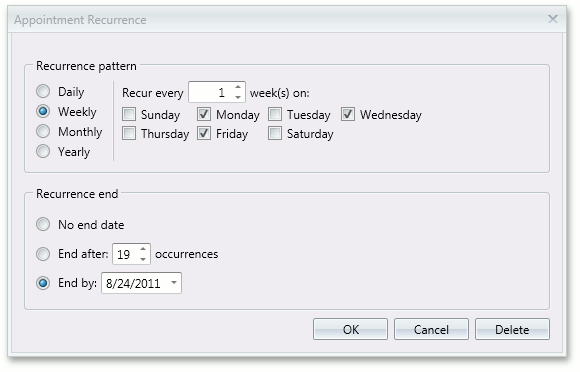Recurring Appointments and Exceptions
- 4 minutes to read
Note
You are viewing documentation for the legacy WPF Scheduler control. If you’re starting a new project, we strongly recommend that you use a new control declared in the DevExpress.Xpf.Scheduling namespace. If you decide to upgrade an existing project in order to switch to the updated scheduler control, see the Migration Guidelines document.
This document introduces the main concepts behind the creation and use of recurring appointments in your scheduling application. The SchedulerControl can process end-user appointments based on a daily, weekly, monthly, or yearly recurrence pattern, either with an end condition or without any end date. You’re also able to create exceptions to these recurring series, and this makes using recurring appointments more useful in real scheduling applications.
Non-Recurring and Recurring Appointments
All appointments within the SchedulerControl can be either simple (non-recurring), occurring only once in the specified time interval, or recurring many times in the same interval. Whether an appointment is recurring or not is identified by the Appointment.IsRecurring value.
Recurring appointments can be of different types. Note that the type of any particular appointment is accessed via its Appointment.Type property. The following image demonstrates the possible types of recurring appointments.

So, a recurring appointment can either be a base (a Pattern), or an occurrence. Occurring appointments can either be a simple Occurrence, or an exception (a ChangedOccurrence or a DeletedOccurrence). The following sections describe the differences between these recurring appointments.
Base Recurring Appointment and Recurrence Pattern
Every series of a recurring appointment is specified by its base appointment (Pattern), which is returned by the Appointment.RecurrencePattern property of all other appointments in the series. The Pattern appointment contains information about a recurrence. Actually, it sets the start date and time of the recurrence series and specifies a rule, according to which a series is repeated. This recurrence rule is accessed via the pattern’s Appointment.RecurrenceInfo property.
The Pattern appointment is stored in the AppointmentStorage collection. All other Occurrence appointments (except for ChangedOccurrence and DeletedOccurrence) are not stored in any collection. They are automatically generated at runtime according to the RecurrenceInfo of the pattern appointment.
Note
A series of recurring appointments can be either finite or infinite. Occurrence appointments are not stored in any collection, to avoid stack overflow for infinitive recurring series.
End-users can edit the recurrence pattern of any appointment at runtime via the Appointment Recurrence form. The image below demonstrates the common appearance of this dialog.

There are different types of recurrence patterns which can be used to specify the rule for recurring series. The following table describes what properties of the RecurrenceInfo are used for different recurrence patterns.
You can use the OccurrenceCalculator instance to calculate occurrences. The OccurrenceCalculator.CalcOccurrences method creates a sequence of appointments for the specified pattern within the specified time interval.
Recurrence Pattern Exceptions
As stated above, from all the recurring series only the Pattern appointment is stored in the SchedulerStorage.AppointmentStorage collection. Others (Occurrence) are usually generated at runtime, to avoid excessive use of system memory.
However, every Pattern appointment contains a collection of exceptions. Exceptions are the Occurrence appointments which have either been changed or deleted, and so no longer meet the common recurrence rule specified by the pattern appointment.
Note
All occurrences within a recurring series are associated with the same resource. A changed occurrence can differ from its pattern by a subject, description, label, status, start time, end time, but not by a resource.
A collection of exceptions for a particular recurrence pattern is returned via the pattern’s Appointment.GetExceptions method. This collection contains both appointments of the AppointmentType.ChangedOccurrence and AppointmentType.DeletedOccurrence types. Note that if an appointment is contained in this collection, then in this case, the corresponding Occurrence appointment will not be generated.
Note
To stop an appointment from being an exception, you should call the Appointment.RestoreOccurrence method for it.